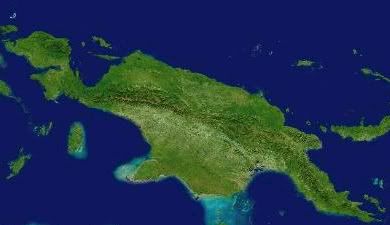Papua New Guinea could be major biofuels producer

Here at the Biopact we focus on chances for development in the poorer regions of this world, offered by the nascent biofuels and bioenergy industry. If one looks at the scientific projections of the biomass production potential of different parts of the world, it immediately becomes apparent that several regions stand out: most notably Central Africa, Latin America and South-East Asia, including the large island of Papua.
In-depth studies by the IEA Bioenergy Task 40, which analyses the global bioenergy potential, have shown that on a per capita basis, Papua New Guinea can easily satisfy its growing energy needs entirely and sustainably by relying on green fuels, and that it can produce a very large excess that it can export.
As the Pacific’s biggest copra producer, Papua New Guinea has the potential of becoming a major producer of biodiesel, first and foremost. There is already increasing interest in the Pacific in using coconut oil for local biodiesel production and shells for electricity generation due to increasing fuel prices.
According to the Australia and New Zealand Bank’s (ANZ) Pacific quarterly report (earlier post), copra is by far the most significant crop in the Pacific Islands and has a good potential for use in biofuels. ANZ said Papua New Guinea is the region’s biggest copra producer, followed by Vanuatu, the Solomon Islands and Fiji. Samoa also has extensive coconut plantations. "While other alternative sources of power such as solar and wind power are also gaining attention, biofuels remain attractive because they can be used in existing generators," ANZ said. Unelco in New Caledonia has installed new power generators on the Loyalty Islands that run solely on coconut oil.
For decades, Pacific nations have produced copra for domestic consumption and export. Vanuatu exports copra to Germany for processing into coconut oil and already the oil is being used or tested by power suppliers in Vanuatu, New Caledonia, Samoa and Fiji.
ANZ said producing that oil would require 12,000 tonnes of copra, according to recent research by the Vanuatu commodities marketing board. Samoa’s Electric Power Corp is testing a blend that includes 20% coconut oil and the Fiji electricity authority also plans to use vegetable oil in its generators. ANZ said while the development of a Pacific biofuels industry sounds attractive in theory, there are serious impediments:
 ethanol :: biodiesel :: biomass :: bioenergy :: biofuels :: energy :: sustainability :: copra :: Papua New Guinea ::
ethanol :: biodiesel :: biomass :: bioenergy :: biofuels :: energy :: sustainability :: copra :: Papua New Guinea :: One major hurdle is the uncertainty over land tenure, it said. In much of the Pacific, land is communally owned by traditional owners, ANZ said. "The investment needed to set up the large-scale plantations that would underpin a viable industry will not be forthcoming without land ownership certainty," ANZ said.
Globally, much of the biofuel focus has been on the world’s big producers such as Brazil, where ethanol from sugar cane plantations is widely used with 70% of new cars produced there able to run on ethanol and normal gasoline. But in the much smaller biofuel market of the South Pacific, coconut oil, rather than ethanol, is the focus.
Coconut oil is extracted from copra, the dried flesh of the coconut.
Another major problem is the question over Papua New Guinea's unique environment and biodiversity, with its pristine rainforests and its many endemic species. Vast swathes of the island are suitable for monocrops like palm oil or nipa fruticans, and if oil prices stay high, the temptation might be great to effectively start converting forests into plantations. Unlike crops in the North (maize, sunflower, rapeseed), tropical energy crops and biofuels can compete with oil as long as prices stay above US$40-50.
However, an alternative consists of the so-called system of "compensated reduction", which was first called for by Papua New Guinea, and which comes down to the international community 'compensating' tropical countries not to cut down their forests in exchange for carbon credits that can be traded on a global market. After all, these forests are the lungs of the earth and the carbon sinks we must keep standing.
It remains to be seen which route Papua New Guinea will take: producing biofuels and selling them on the global market? Or being more prudent by demanding carbon credits for not making use of its potential as a biofuels producer?
More information:
The National (Papua New Guinea): PNG could be major bio-fuel producer: ANZ - s.d.
Biopact: "Pay us and we will not burn down our forests": a look at 'Compensated Reduction' - September 02, 2006
 -------------------
-------------------
 Spanish company Ferry Group is to invest €42/US$55.2 million in a project for the production of biomass fuel pellets in Bulgaria.
The 3-year project consists of establishing plantations of paulownia trees near the city of Tran. Paulownia is a fast-growing tree used for the commercial production of fuel pellets.
Spanish company Ferry Group is to invest €42/US$55.2 million in a project for the production of biomass fuel pellets in Bulgaria.
The 3-year project consists of establishing plantations of paulownia trees near the city of Tran. Paulownia is a fast-growing tree used for the commercial production of fuel pellets.









0 Comments:
Post a Comment
Links to this post:
Create a Link
<< Home